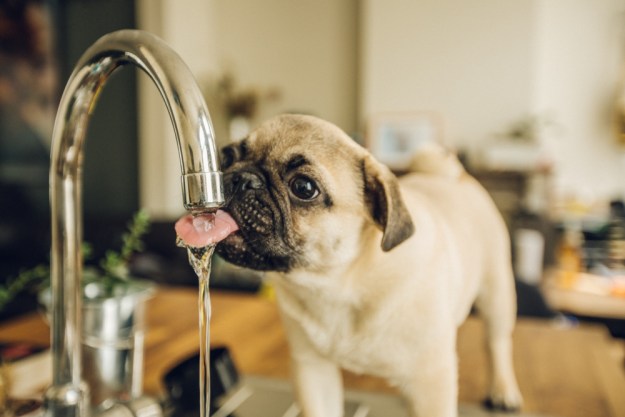Few things are more exciting than bringing home a new puppy, but puppies can also be a lot of work. From selecting new bedding and toys to finding the best food for your new fur baby, you’ll probably spend a lot of time researching all things puppy. If you’ve found yourself Googling “puppies first shots,” you’ve come to the right place. We’ll share what the experts have to say about crafting a puppy shot schedule you can stick to. But, as always, you should consult your puppy’s veterinarian if you have any questions, as your vet is equipped to help you make the best decisions regarding your puppy’s needs.

When should puppies get shots?
Generally speaking, your puppy will receive his first set of vaccinations when he’s 6-8 weeks old. In most cases, your pup will have already received his first set of shots before you adopt him. However, if you’re caring for a litter of newborn puppies, or you’ve rescued a stray younger than 6 weeks of age, you’ll need to speak with your vet to come up with a vaccination schedule. Most vaccinations are administered on a 2-4 week basis, lasting until your pup is 16-18 weeks of age, though most dogs will require annual booster shots. If you don’t know your puppy’s medical or vaccination history, your vet will likely complete a full exam and may recommend a different course of action.
What shots do puppies need?
Vaccinations are split into two different groups: core vaccinations, or vaccinations all puppies require, and non-core vaccinations, which are administered on the basis of your location, your dog’s lifestyle, and potential risk factors. Core vaccines recommended by the American Animal Hospital Association (AAHA) Canine Vaccine Task Force include:
- Rabies: This vaccine is required by law in most — but not all — states. Check your local ordinance to ensure you’re in compliance with the law. Or, better yet, have your fur baby vaccinated against rabies whether it’s required or not. If infected, once your pup begins to exhibit symptoms, rabies is almost always fatal. Only 14% of dogs infected by the rabies virus survive.
- Canine parvovirus: Parvo is a highly contagious infectious disease that spreads through contact with an infected animal, or contaminated feces, environments, or people. It can be fatal, so this vaccine is essential.
- Canine distemper: Distemper is an extremely contagious viral disease found in domestic dogs, raccoons, skunks, ferrets, foxes, wolves, and felines. It is usually fatal, and dogs who survive often suffer lasting, incurable nerve damage.
- Canine adenovirus-2 (CAV-2, or canine hepatitis): An infectious respiratory disease, hepatitis can lead to serious complications, including pneumonia.
Vaccines for distemper, hepatitis, and parvo are often grouped together and referred to as DHP or DAP vaccinations.

Non-core vaccines recommended by the AAHA Canine Vaccine Task Force include:
- Canine influenza: Also called dog flu, canine influenza is an infectious respiratory disease caused by influenza Type A.
- Kennel cough (Bordetella bronchiseptica): Another name for infectious bronchitis, kennel cough is extremely common in animal shelters.
- Canine parainfluenza virus: Resembling traditional canine influenza, the canine parainfluenza virus (CPIV) is a different virus entirely.
- Lyme disease (Borrelia burgdorferi): Also called Lyme borreliosis, this bacterial infection is transmitted by ticks.
- Canine Leptospirosis (Leptospira genus): A bacterial infection that is usually contracted after dogs swim in or drink water contaminated by infected wildlife.
- Coronavirus: With COVID-19 running rampant, pet parents began to fear for their pups. While the canine coronavirus (CCoV) isn’t the same as SARS-CoV-2, demand for the coronavirus vaccine has increased. However, the vaccine is not recommended for all dogs. Speak to your vet if you think your dog is at risk.
The American Heartworm Society also recommends beginning a heartworm prevention protocol when your pup is 6-8 weeks old.
Puppy shot schedule
Depending on where you live and your puppy’s risk factors, your vet may recommend different vaccination schedules for different pups. Because not all puppies require every vaccine, it’s important to have an in-depth discussion with your vet before you vaccinate your new pooch. However, a general vaccination schedule may resemble the following:
- 6-8 weeks of age: distemper, parvovirus (recommended), Bordetella (optional).
- 10-12 weeks of age: DHPP — for distemper, hepatitis, parvo, and parainfluenza — (recommended), influenza, Bordetella, Lyme disease, and Leptospirosis (optional).
- 16-18 weeks of age: DHPP, rabies (recommended), influenza, Bordetella, Lyme disease, and Leptospirosis (optional).
- 12-16 months of age: DHPP booster, rabies booster (recommended), Bordetella, Lyme disease, Leptospirosis, and coronavirus (optional).

Your vet will know what’s best for your pup
Your pup will need DHPP and other optional booster shots every 1-2 years. Your vet can help you decide which vaccines your pup needs based on potential risk factors and lifestyle. You’ll also want to have your pup vaccinated against rabies every 1-3 years, depending on your vet’s recommendations and local requirements. While the average cost of vaccinations ranges from $75-$100, your dog’s health is priceless.
Editors' Recommendations
- Why does my dog have a bald patch on their tail? Here are the answers you need
- Looking for signs your dog has ticks? These telltale symptoms mean you have a flea or tick problem
- When do kittens start eating food? Know the facts for your fur baby’s health
- How much water should your puppy drink in a day? Here are the factors to consider
- Where to put a dog crate in your house depends on these important factors




